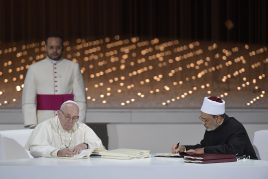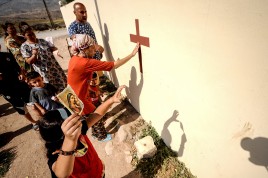VISIT
SIR spoke with Card. Louis Raphael Sako, Chaldean Patriarch of Babylon in Baghdad, about Pope Francis’ visit to Iraq, “probably in Spring 2020”. His Eminence expressed the hope that the Pope and the Shiite religious leader may sign “in Najaf” the document on human fraternity signed in Abu Dhabi by Sunni leader Al Tayyeb. An interreligious prayer in Ur of the Chaldees and the meeting with displaced persons in the Nineveh Plains in Erbil could be precious integrations to the visit. The Pope will be coming “as a new Ezekiel to pave the way to a future of peace”

“Pope Francis is a warmhearted man, seeker of human fraternity and peace. Everyone in Iraq, Christians and Muslims, admire his simplicity and closeness. His words touch everyone’s heart, for they are those of a shepherd. He has the capacity to foster peace. Millions of Muslims have followed the Pontiff’s visit to Abu Dhabi. It will be the same in Iraq.” Cardinal Louis
 Raphael Sako, Patriarch of Babylon of the Chaldeans, spoke of the announced visit of Pope Francis to Iraq planned for 2020, “probably in the spring, unless there are tensions or security problems.” “The Holy Father thinks constantly of Iraq”, pointed out the Chaldean Patriarch. Francis unveiled the purpose of the visit in his announcement to the participants in the reunion of Aid Agencies for the Oriental Churches (ROACO), namely, for Iraq to face the future “through the peaceful and shared pursuit of the common good on the part of all elements of society, including the religious, and not fall back into hostilities sparked by the simmering conflicts of the regional powers.’” Card. Sako spoke to SIR on the sidelines of the meeting of partners of Caritas Iraq held in Baghdad July 1-3, promoted by the same local Caritas in close synergy with Caritas Internationalis.
Raphael Sako, Patriarch of Babylon of the Chaldeans, spoke of the announced visit of Pope Francis to Iraq planned for 2020, “probably in the spring, unless there are tensions or security problems.” “The Holy Father thinks constantly of Iraq”, pointed out the Chaldean Patriarch. Francis unveiled the purpose of the visit in his announcement to the participants in the reunion of Aid Agencies for the Oriental Churches (ROACO), namely, for Iraq to face the future “through the peaceful and shared pursuit of the common good on the part of all elements of society, including the religious, and not fall back into hostilities sparked by the simmering conflicts of the regional powers.’” Card. Sako spoke to SIR on the sidelines of the meeting of partners of Caritas Iraq held in Baghdad July 1-3, promoted by the same local Caritas in close synergy with Caritas Internationalis.
This visit is in the wake of the visit to Abu Dhabi where the Pontiff and the great Sunni Imam Al Tayyeb, signed the document on human fraternity…
I think it’s very important to help people see each other as brothers and not as enemies or opponents. We all live together, we work, we’re close, we don’t have to be afraid. A certain mindset and culture should change. I hope the visit of Pope Francis will represent a significant moment for our Shiite Muslim brothers. The Abu Dhabi Document, in fact, was signed by the Sunnis and not by the Shiites.
I hope the Pope will meet with Ayatollah Ali al Sistani, the spiritual guide of the Shiites, and sign the same document with him.
If there is something to be changed in the content this can be done, although I believe it already enshrines the basic principles. It would signal a Muslim world united in saying no more wars, no more death and destruction. Human dignity is an absolute value.”
Could a stop at the Shiite holy city of Al Najaf to meet the Ayatollah Ali al Sistani, spiritual guide of the Shiites in Iraq, be added to the papal program?
From Baghdad to Najaf it’s a mere 20-minute flight. I think there should be time enough for a meeting and signing of the Document.
The issue of citizenship – requested by Iraqi Christians and by other minority groups – is closely connected with the Abu Dhabi document.
It’s the heart of the matter. We are Iraqi citizens of Christian faith, we are tied to our land where we have lived since pre-Islamic times, it’s our homeland. Wherever I go I will always be bound to it.
The government must introduce reforms to ensure equal rights for all citizens,
there is no such thing as Christian or Muslim human rights, there is a human foundation for all. I am a citizen, regardless of whether I am Christian or Muslim. Religion must be separated from politics. The Constitution must be based on citizenship. The time of sectarianism is over. The international community must exert pressure on Middle Eastern governments to ensure the separation of religion and State.
Ur of the Chaldeans, the birthplace of the three Abrahamic religions, Judaism, Christianity and Islam, could be a main destination on the papal journey.
Ur could be the venue of an inter-religious meeting. Some passages related to Abraham in the Koran could be sung by an Imam. We Christians could read a passage from the Bible. This could be followed by universal prayers and two speeches.
Thus a message to the whole world could be sent from Ur: in the faith we are all children of Abraham. Abraham is a man who has faith in the Lord. There are symbols that can touch the heart of every man, even if that man is a fundamentalist.
God has hope also in the evil man, and He awaits him as the good father awaits his son in the parable of the prodigal son.
Which Iraq will the Pope find? A country that is striving to move on from past wars, notably the recent invasion by ISIS …
A divided, fragmented Iraq, filled with wreckage and marked by many mistakes.
For us the Pope will be a new Ezekiel,
the prophet who lived in Babylon speaking to the Jews who at the time lived like we do today: far from their homeland, as refugees, and discouraged. Ezekiel reveals the prophecy of dry bones (Chapter 37): “Prophesy to these bones, and say to them, O dry bones, hear the word of the Lord. Thus says the Lord God to these bones: Behold, I will cause breath[d] to enter you, and you shall live. And I will lay sinews upon you, and will cause flesh to come upon you, and cover you with skin, and put breath[e] in you, and you shall live; and you shall know that I am the Lord.”
I hope in the rebirth of Iraq and of the Iraqis, I pray for a new life. The Pope, the new Ezekiel, can pave the way to a future of peace.
It’s a beautiful image that I carry inside me, and who knows that it may perhaps be recalled in the theme of the papal journey.
Pope Francis has been wanting to visit the displaced Christian population of the Nineveh Plains who found refuge in Erbil, Kurdistan. After ISIS was pushed out, many families are returning. At what point is their return and the reconstruction of their houses?
More than half of all Christian families have returned to their homes, while many others have left the country. I wrote an article on ‘refugee theology’ in which I compare our hope today with that of the Jews exiled to Babylon. In Nineveh we see the joy of those returning to their villages and the happiness of having rebuilt what had been destroyed. As shepherds we are called to instil hope in our people, accompanying them and listening to them. We are not administrators but shepherds. As compared to those who emigrated, those who stayed have been rekindling their history and nourishing the spirit with hope for the future. And they are back. Those who have left are called on to start another journey somewhere else, learn a new language, a different mentality and traditions.
How can Christians preserve their identity in this land where they were born and where they have always acted as a bridge between other faiths and ethnic groups?
As Archbishop of Kirkuk I used to organize meetings with all local religious leaders, Shiites, Sunnis, Kurds, Turkmen, and all were aware that only the Church could bring them together. We have a vocation for unity that gives us strength and joy. Not everything is dark here.
We also have glimmers of light.